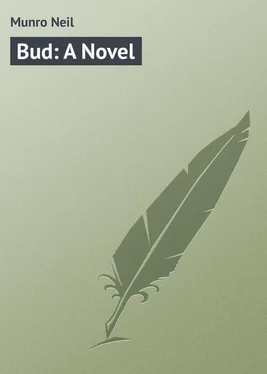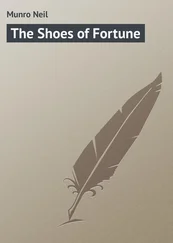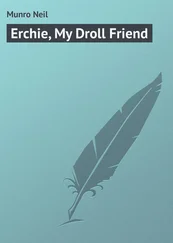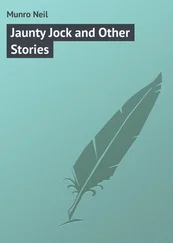Neil Munro - Bud - A Novel
Здесь есть возможность читать онлайн «Neil Munro - Bud - A Novel» — ознакомительный отрывок электронной книги совершенно бесплатно, а после прочтения отрывка купить полную версию. В некоторых случаях можно слушать аудио, скачать через торрент в формате fb2 и присутствует краткое содержание. ISBN: , Жанр: foreign_prose, на английском языке. Описание произведения, (предисловие) а так же отзывы посетителей доступны на портале библиотеки ЛибКат.
- Название:Bud: A Novel
- Автор:
- Жанр:
- Год:неизвестен
- ISBN:http://www.gutenberg.org/ebooks/43731
- Рейтинг книги:5 / 5. Голосов: 1
-
Избранное:Добавить в избранное
- Отзывы:
-
Ваша оценка:
- 100
- 1
- 2
- 3
- 4
- 5
Bud: A Novel: краткое содержание, описание и аннотация
Предлагаем к чтению аннотацию, описание, краткое содержание или предисловие (зависит от того, что написал сам автор книги «Bud: A Novel»). Если вы не нашли необходимую информацию о книге — напишите в комментариях, мы постараемся отыскать её.
Bud: A Novel — читать онлайн ознакомительный отрывок
Ниже представлен текст книги, разбитый по страницам. Система сохранения места последней прочитанной страницы, позволяет с удобством читать онлайн бесплатно книгу «Bud: A Novel», без необходимости каждый раз заново искать на чём Вы остановились. Поставьте закладку, и сможете в любой момент перейти на страницу, на которой закончили чтение.
Интервал:
Закладка:
Neil Munro
Bud: A Novel
CHAPTER I
THE town’s bell rang through the dark of the winter morning with queer little jolts and pauses, as if Wanton Wully Oliver, the ringer, had been jovial the night before. A blithe New-Year’s-time bell; a droll, daft, scatter-brained bell; it gave no horrid alarms, no solemn reminders that commonly toll from steeples and make good-fellows melancholy to think upon things undone, the brevity of days and years, the parting of good company, but a cheery ditty – “boom, boom, ding-a-dong boom, boom ding, hie, ding-dong,” infecting whoever heard it with a kind of foolish gayety. The burgh town turned on its pillows, drew up its feet from the bed-bottles, last night hot, now turned to chilly stone, rubbed its eyes, and knew by that bell it was the daftest of the daft days come. It cast a merry spell on the community; it tickled them even in their cosey beds. “Wanton Wully’s on the randan!” said the folk, and rose quickly, and ran to pull aside screens and blinds to look out in the dark on window-ledges cushioned deep in snow. The children hugged themselves under the blankets, and told one another in whispers it was not a porridge morning, no, nor Sunday, but a breakfast of shortbread, ham, and eggs; and behold! a beautiful, loud drum, careless as ‘twere a reveille of hot, wild youths, began to beat in a distant lane. Behind the house of Dyce, the lawyer, a cock that must have been young and hearty crew like to burst; and at the stables of the post-office the man who housed his horses after bringing the morning mail through night and storm from a distant railway station sang a song:
“‘A damsel possessed of great beauty
Stood near by her own father’s gate:
The gallant hussars were on duty;
To view them this maiden did wait.
Their horses were capering and prancing,
Their accoutrements shone like a star;
From the plains they were quickly advancing —
She espied her own gallant hussard”
“Mercy on us, six o’clock!” cried Miss Dyce, with a startled jump from her dreams to the floor of her bedroom. “Six o’clock on the New Year’s morning, and I’ll warrant that randy Kate is sound asleep yet,” she said, and quickly clad herself and went to the head of the stair and cried, “Kate! Kate! are ye up yet, Kate? Are ye hearing me, Kate MacNeill?”
From the cavern dark of the lower story there came back no answer.
She stood with a curious, twirly wooden candlestick in her hand in the midst of a house that was dead dumb and desperate dark and smelled deliciously of things to eat. Even herself, who had been at the making of most of them the day before, and had, by God’s grace, still much of a child’s appetite, could not but sniff with a childish satisfaction at this air of a celestial grocery – of plum-puddings and currant-buns, apples and oranges, cordials and spices, toffee and the angelic treacly sweet we call Black Man – her face lit rosily by the candle low, a woman small and soft and sappy, with the most wanton reddish hair, and a briskness of body that showed no sign as yet of her accomplished years. What they were I will never tell you; but this I’ll say, that even if they had been eighty she was the kind to cheerily dance a quadrille. The daft bell, so plainly in the jovial mood of Wanton Wully Oliver, infected her: she smiled to herself in a way she had when remembering droll things or just for simple jollity, and whoever saw Bell Dyce smile to herself had never the least doubt after that she was a darling. Over the tenements of the town the song of the bell went rollicking, and in its hiccoughing pauses went wonderfully another sound far, far removed in spirit and suggestion – the clang of wild geese calling: the “honk, honk” of the ganders and the challenge of their ladies come down adrift in the snow from the bitter north.
But there was no answer from the maid in the kitchen. She had rolled less deliberately than was usual from her blankets to the summons of the six-o’clock bell, and already, with the kitchen window open, her bounteous form surged over the two sashes that were always so conveniently low and handy for a gossip with any friendly passer-by on the pavement. She drank the air of the clean, chill morning dark, a heady thing like old Tom Watson’s autumn ale, full of the sentiment of the daft days. She tilted an ear to catch the tune of the mail-boy’s song that now was echoing mellow from the cobwebbed gloom of the stable stalls, and, making a snowball from the drift of the window-ledge, she threw it, woman wise, aimlessly into the street with a pretence at combat. The chill of the snow stung sweet in the hot palm of her, for she was young and strong.
“Kate, you wretch!” cried a voice behind her. She drew in her head, to find her mistress in the kitchen with the candlestick in her hand.
“Oh, m’em,” cried the maid, no way abashed, banging up the window and hurriedly crushing her more ample parts under the final hooks and eyes of her morning wrapper – “oh, m’em, what a start you gave me! I’m all in a p-p-palpitation. I was just takin’ one mouthful of air and thinkin’ to myself yonder in the Gaelic that it was time for me to be comin’ in and risin’ right.”
“A happy New Year to you, Kate MacNeill,” said the mistress, taking her hand.
“Just that, just that! and the same to you yourself, Miss Dyce. I’m feeling fine; I’m that glad with everything,” said the maid, in some confusion at this unusual relation with her mistress. She shook the proffered hand rapidly from side to side as if it were an egg-switch.
“And see and get the fires on quick now, like a good lass. It would never do to be starting the New Year late – it would be unlucky. I was crying to you yonder from the stair-head, and wondering if you were ill, that you did not answer me so quickly as you do for ordinar’.”
“Ill, Miss Dyce!” cried the maid, astounded. “Do you think I’m daft to be ill on a New Year’s Day?”
“After yon – after yon shortbread you ate yesterday I would not have wondered much if you were,” said Miss Dyce, shaking her head solemnly. “I’m not complaining, but, dear me! it was an awful lump; and I thought it would be a bonny-like thing, too, if our first-foot had to be the doctor.”
“Doctor! I declare to goodness I never had need of a doctor to me since Dr. Macphee in Colonsay put me in order with oil and things after I had the measles,” exclaimed the maid, as if mankind were like wag-at-the-wa’ clocks, and could be guaranteed to go right for years if you blew through them with a pair of bellows or touched their works with an oily feather.
“Never mind about the measles just now, Kate,” said Miss Dyce, with a meaning look at the black-out fire.
“Neither I was mindin’ them, m’em – I don’t care a spittle for them; it’s so long ago I would not know them if I saw them; I was just – ”
“But get your fire on. You know we have a lot to do to-day to get everything nice and ready for my nephew who comes from America with the four-o’clock coach.”
“America!” cried the maid, dropping a saucepan lid on the floor in her astonishment. “My stars! Did I not think it was from Chickagoo?”
“And Chicago is in America, Kate,” said her mistress. “Is it? is it? Mercy on me, how was Kate to know? I only got part of my education – up to the place where you carry one and add ten. America! Dear me, just fancy! The very place that I’m so keen to go to. If I had the money, and was in America – ”
It was a familiar theme; Kate had not got fully started on it when her mistress fled from the kitchen and set briskly about her morning affairs.
And gradually the household of Dyce, the lawyer, awoke wholly to a day of unaccustomed stillness and sound, for the deep snow piled in the street and hushed the traffic of wheel and hoof and shoe, but otherwise the morning was cheerful with New-Year’s-Day noise.
Читать дальшеИнтервал:
Закладка:
Похожие книги на «Bud: A Novel»
Представляем Вашему вниманию похожие книги на «Bud: A Novel» списком для выбора. Мы отобрали схожую по названию и смыслу литературу в надежде предоставить читателям больше вариантов отыскать новые, интересные, ещё непрочитанные произведения.
Обсуждение, отзывы о книге «Bud: A Novel» и просто собственные мнения читателей. Оставьте ваши комментарии, напишите, что Вы думаете о произведении, его смысле или главных героях. Укажите что конкретно понравилось, а что нет, и почему Вы так считаете.












